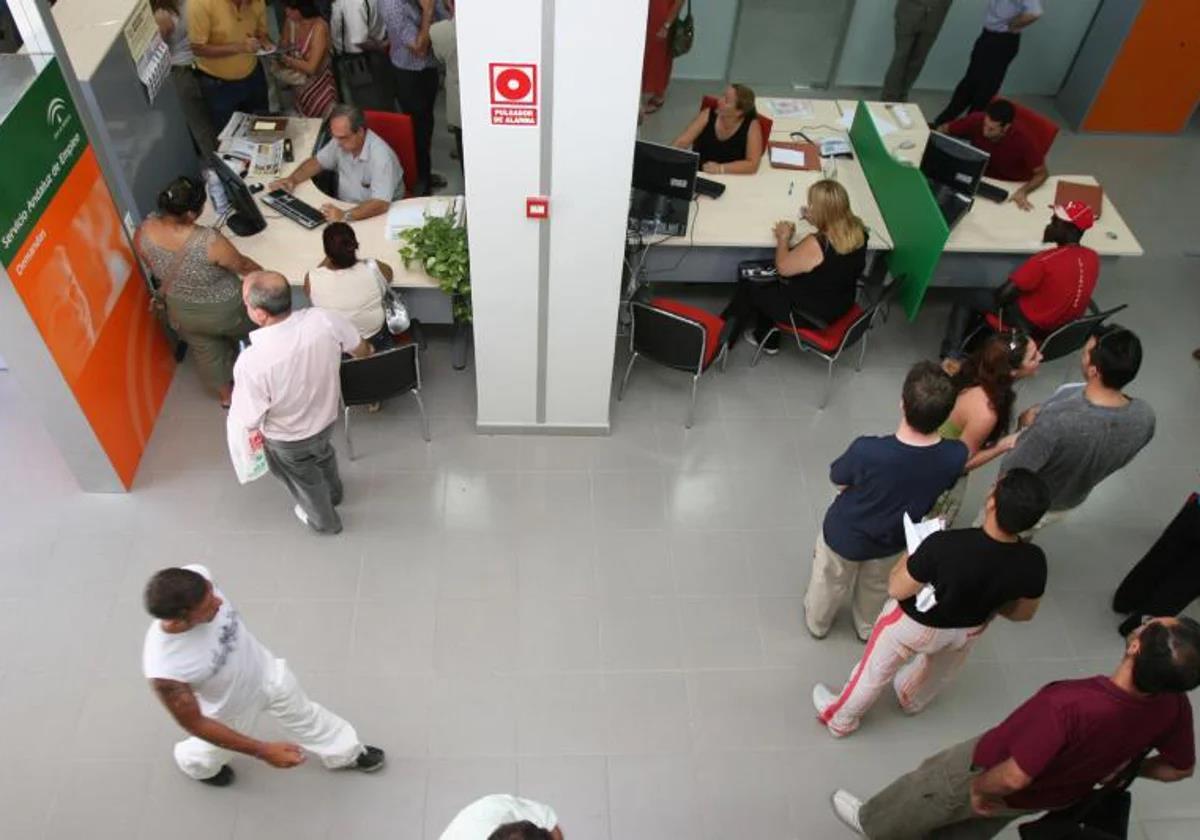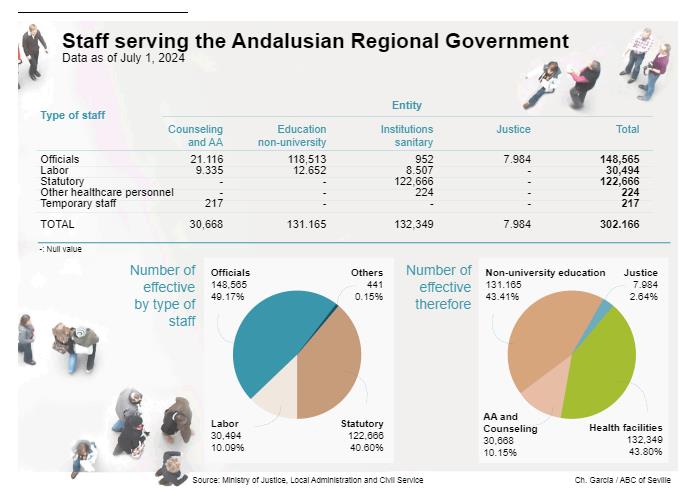

Sections
Highlight

Antonio R. Vega
Seville
Tuesday, 22 April 2025, 19:38
The Junta de Andalucía has never had as many civil servants on its payroll as it does now. For the first time it has surpassed the psychological barrier of 300,000, according to the Junta's latest report on staffing statistics, which includes a snapshot of the number of employees hired up to 1 July 2024. The regional justice ministry that is also in charge of the civil service publishes a bulletin every six months with a breakdown of HR data in the region's public sector. The latest official figure, published at year end, shows that there are 302,166 people working directly for Andalucía's regional government in some capacity or other.
This represents a remarkable leap in numbers since records began. Six months earlier, on 1 January 2024, there were 293,633 registered employees.
To put this milestone in context, it is worth looking at the data provided by the labour force survey (EPA) for the second quarter of 2024. The number of staff employed by the Junta is close to 9% of the working population for the whole region. The exact figure is 8.7% of the working population of 3,478,900. By 'working population' the EPA means those working in Andalucía for private or public organisations, as well as the self-employed, at the end of June 2024.

This record-breaking high in staffing numbers can be explained by several changes to recruitment. There was a swathe of internal competitions to create more permanent positions for interim staff on temporary contracts. The first round of these trials was held in 2017 and this has reduced the Junta's temporary employment rate to below 8% in line with the recommendations set by the European Union to avoid abuses in this type of contract. Likewise, the recruitment of healthcare professionals both during and after the pandemic, along with the increase in the number of teachers for primary and secondary education, have been a major factor in boosting the public sector workforce in Andalucía.
Since Juanma Moreno (Partido Popular, PP) arrived at the San Telmo Palace in Seville (the seat of the regional presidency), the Junta and its various governing bodies and agencies have directly employed 60,391 more people. This means 25% more employees than the 241,775 staff under the last PSOE government, presided over by Susana Díaz.
During the fallout from the earlier economic crisis over the last ten years or so, the workforce in every public governing body had shrunk. Faced with the scenario of having to make severe budget cuts, between 2012 and 2014 Spain's central government, by means of its control over the general state budget, banned the replacement of any roles following redundancies and froze public service recruitment calls.
These recruitment caps meant that, in July 2016, the number of staff employed by the Junta stood at only 237,270, a far cry from current figures. As a result, the civil servants and other staff had to take on heavier workloads . This situation also included these employees seeing their salaries frozen and losing extra pay and other rights such as social action grants, rights that have not yet been fully recouped.
So, the Junta's statistical bulletin as of 1 July 2024 also provides a fairly detailed profile of those employed in the public sector by type of staff and profession. Of the 302,166 public employees under the Junta, the largest group is that of civil servants. They number 148,565, representing almost half (49.17%) of all employees. The majority (118,513) are non-university teachers, while a further 21,116 are employed in regional and local government departments and administrative agencies. Civil service status also applies to those working for the judiciary (7,984 staff or 2.64%) and, lastly, 952 people working in health institutions.
The next largest group consists of statutory staff (transferred from the state health service to Andalucía's regional health service - SAS) and these number 122,666. Next are another 30,494 employees, of whom 8,507 are assigned to health institutions, 12,652 to education and 9,335 to the various regional ministries and agencies. There are 224 staff classified as "other health personnel". There are also 217 temporary staff , mainly advisors who occupy a post with the Junta on a freelancing basis.
Health (SAS) directly employs 132,349 professionals, mainly doctors and nurses, who account for 43.8% of the workforce of the regional government. They outnumber the non-university teaching staff by just over 1,000 (131,165 teachers, 43.4% of the Junta's total workforce). Both groups account for 87% of the human resources that keep regional services going.
Of the 302,166 public employees working for the Junta, more than two thirds are women (68.7%) - that translates to 207,454 female workers and 94,712 males.
With Seville being home to the main headquarters of all regional ministries and related bodies, this is also reflected in how many posts are located there. Seville is home to 24% of the total number of employees working for the regional government in some capacity: 72,420 in absolute figures. Seville is followed by Malaga province with 51,864 employees (17.1% of public employees in the region) and Cadiz province with 41,368 (13.7%).
The cuts made following the past crisis have left their scars. The Junta's workforce is ageing. The regional government has launched a plan to find replacements for 40% of the civil servants who are going to retire in its regional departments by 2030. In the coming years "there is going to be a massive influx of people into public service because we are going to have a massive outflow of civil servants", said José Antonio Nieto back in February as regional minister for the civil service. "The administration in Andalucía cannot lose staff so, as they retire, we have to bring in others and try to bring in the best," he said.
Seven out of ten workers working for the Junta are over 50 years old. The governing party in the region has set a strategy for the years up to 2030 to rejuvenate its workforce. The goal is to attract the so-called 'millenials' (those born between 1980 and 1995) and 'centennials' (born between 1996 and 2012) to work in the region's public sector. At the same time, it plans to retrain its civil servants training so they can adapt their way of working to the new demands of society.
The action plan is included in the Junta's 2023-2030 strategic HR plan, which was approved by the governing council after round-table discussions and negotiations with the trade unions relevant to the professions and trades in public service.
The changes in the reorganisation of staff employed by the Junta also affect the processes of selection, training, organisation, skills qualification and professional development of those working in public service in order to respond effectively and efficiently, not only to the needs of governing in the 21st century, but also to create flexible structures that are adaptable to future challenges.
In the new staff selection systems, the qualifications and professional skills of each applicant for a specific post will carry more weight than at present. In this way, the Junta de Andalucía hopes to attract versatile and polyvalent (multi-skilled) staff. These professionals tend to opt for employment in private companies as salaries are higher than in public bodies. The new selection processes will incorporate new "emerging" profiles such as the newly created specialities in the legal framework and computer engineering that provide senior roles.
This plan is adding to the guidelines set out in Andalucía's most recent law for the civil service, which was approved by regional parliament on 31 May 2023. In line with the aforementioned regulation, the regional government will introduce a salary supplement for professional performance to increase the remuneration of those public employees who work best on the basis of a series of objective criteria, yet to be specified, which will check the performance, conduct or achievement of results of each employee.
The model for competitive entry and promotion is also being revised. In order to gain access to a post as a senior civil servant, a six-month internship will be required. This training course or probationary period will have an eliminatory character to it because there will be more trainee civil servants than places to be awarded in the Junta de Andalucía . At least 20% of the applicants who have passed previous exercises used in the call for applications will not pass muster this time around.
The Junta plans to start testing the new system of competitive examinations from this year onwards in a few specific positions, with the idea of applying it progressively to other applicable job roles.
Publicidad
Publicidad
Publicidad
Publicidad
Esta funcionalidad es exclusiva para registrados.
Reporta un error en esta noticia

Debido a un error no hemos podido dar de alta tu suscripción.
Por favor, ponte en contacto con Atención al Cliente.

¡Bienvenido a SURINENGLISH!

Tu suscripción con Google se ha realizado correctamente, pero ya tenías otra suscripción activa en SURINENGLISH.
Déjanos tus datos y nos pondremos en contacto contigo para analizar tu caso

¡Tu suscripción con Google se ha realizado correctamente!
La compra se ha asociado al siguiente email
Comentar es una ventaja exclusiva para registrados
¿Ya eres registrado?
Inicia sesiónNecesitas ser suscriptor para poder votar.